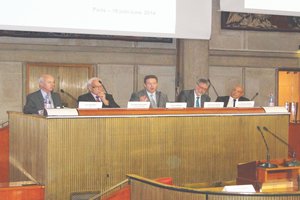News
The MOT network’s annual conference
June 2014
Nearly 130 participants gathered in Paris on 18-19 June for the MOT’s annual general meeting and the conference it organised on this occasion on the topic “Cross-border networks: mutualising public services and experimenting with Europe on each border”.
The conference discussions highlighted the importance of cross-border issues in a political context marked by the renewal of European institutions, the reform of territorial public action and the revision of the Europe 2020 strategy at the halfway point.
Christian Dupessey, Vice-President of the MOT and Mayor of Annemasse, pointed out that this “critical moment” linked to the results of the recent European elections has revealed the worries of many citizens, who are tempted to turn in on themselves in the face of the economic crisis. “Our role is to open up perspectives so as to persuade local populations. We need clear and common direction from elected representatives on either side of the border to persuade people that the solutions will come from more Europe and more cooperation.”
In concrete terms, in order to respond to the increasing flows of people and goods across borders, cross-border territories are putting in place coordinated public services and, in a context of pressure on public spending, they need to seize the opportunity that borders can represent to “pool” resources and infrastructures with the aim of delivering better services at lower cost.
Two very concrete examples were highlighted: energy and health.
Jean Christophe Delvallet, Head of Development – ERDF Méditerranée (Electricity Network Distribution France) illustrated this first theme with examples of the cross-border supply of electricity*, the creation of a cross-border transmission line (the underground Menton-Ventimiglia transmission line) and cross-border “Smart Grids”, such as the “Green Me” project that aims to cover the provinces of northern Italy as far as the Spanish border in order to prepare the networks of the future to support new forms of renewable production and consumption.
Henri Lewalle, a specialist in French-Belgian cross-border healthcare, went on to set out the history and legal framework of this very complex area of cooperation. The French-Belgian border, with an initiative launched more than two decades ago, stands as an example with respect to the organisation of cross-border healthcare services: cross-border access to treatment, coordination of social security systems for the reimbursement of patients, and the organisation of emergency medical care, etc. Today, with six organised zones of access to healthcare, nearly the whole of the French-Belgian border territory is covered.
Following these presentations, a political roundtable showed that in order to foster this cooperation it is necessary to act at several levels: the cross-border organisation of public services for the local population and businesses is first of all the responsibility of local and regional public authorities, but the complexity associated with borders (the meeting of several different legal, political and administrative systems, etc.) means that very significant account needs to be taken of the issues involved at national and European levels.
Regarding the first of these levels, Philip Cordery, Member of the French Parliament for French citizens abroad in Benelux, presented the activities and role of the study group “Border regions and workers” that he chairs at the Assemblée Nationale. He underscored three major challenges for border regions in the future:
- Territorial reform in France and the question of competences: “It is crucial to take account of the specific nature of cross-border issues in this reform in order to facilitate the cooperation of territorial authorities on either side of the border”.
- The French government’s administrative simplification initiative: “Here too, it is vital to include the cross-border dimension so that the administrative procedures for citizens and businesses in cross-border settings are simplified”.
- European issues also remain at the heart of concerns: the creation of EGTCs, access to regional funds, regulations on social security, the end of roaming charges, etc.
José Palma Andrès, Director in the DG REGIO, recalled the European Commission’s role as a facilitator but pointed out that it is first of all the responsibility of governments to remove persistent obstacles on each border. The participants also stressed the need to strengthen the EU’s role in giving impetus to Member States.
Jean-Claude Sinner, representing the Grand Duchy of Luxembourg, set out the objectives of the IT/LV/LU trio**. One of the priorities will be cross-border cooperation and the putting in place of experimental cross-border integration schemes by governments, notably in the area of public services.
The issues of competences and the need to facilitate governance to enable “pooling” and produce economies of scale were at the heart of the discussions.
Jean-Marie Belliard, representing the Alsace Region, summed them up as follows: “sharing one’s sovereignty does not mean losing it”. He called for an overall vision for cross-border territories and for a shift in public action to develop cross-border synergies.
Laurence Girard of the CGET - Commissariat général à l’égalité des territoires (General commission for territorial equality, FR) confirmed that the CGET places cross-border cooperation at the heart of its action. She concluded by recalling the strategic role of observation in enabling appropriate cross-border policies to be implemented.
* A French-Italian interconnector in a valley in the Briançon area and a French-Spanish interconnector near the hospital in Puigcerda.
** Eu Presidency, which starts on 1 July with Italy's presidency and ends in the second half of 2015 with that of Luxembourg.
More info

